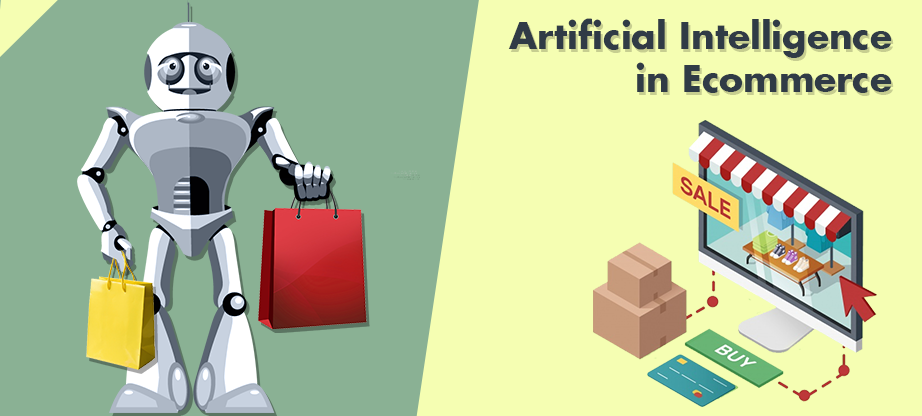Ecommerce AI Trend: Evolution of Artificial Intelligence in Ecommerce
Ecommerce industry is expanding with each passing day, multiplying its global outreach in terms of the number of users and demographics. With over a million active E-commerce websites available on the world wide web, ecommerce businesses are facing cut-throat competition to deliver superior customer experiences through their web stores. In this intensified customer acquisition and retention race, Artificial Intelligence has emerged as a boon for merchants. Although in its infancy, Ecommerce AI is facilitating personalized customer experiences, refined customer targeting and acquisition and improved fraud prevention mechanisms.
According to research by Accenture, AI could boost profitability rates by an average of 38% across 16 industries by 2035.
Driven by the vision to simplify how a customer finds a product, artificial intelligence in ecommerce has evolved a lot over time. Let’s take a look at the individual vertices of an Ecommerce business that have been augmented by AI.
Evolution of Product Search
The very beginning of Ecommerce was marked by “Boston Commercial Exchange” in 1982, a marketplace that used online bulletin boards to post information of their clients who wanted to buy and sell computers. Online deals started happening that long ago and once Netscape launched SSL, monetary transactions started happening securely online.
However, while the Ecommerce operations were kicking off during that decade an easier product search mechanism was still missing. Products were reviewed through online catalogs (which was a humble discovery in itself) before a purchase could be made.
But things evolved in 1995, with Ecommerce giants Amazon and eBay stepping into the playground. By introducing a dynamic search bar on the Homepage, the time it took for buyers to locate their products was substantially reduced.
Even though the design of the website was not anything to die for during those years, the search bar had a magical effect that was really well received by the audience.
Check out our 2017 top 10 picks of Amazing Ecommerce website designs that are pushing the boundaries of user experience in this decade
Web search was introduced in Ecommerce stores to simplify the steps a customer need to take to search a product. While this is still a standard practice in modern Ecommerce websites, stores are using E-retail intelligence to enhance this further. Search bars in ecommerce stores can now be configured with AI-powered voice search along with text-based inputs to understand your context and provide relevant results.
To top it off, using AI assistants like Siri, Google now and Alexa you no longer even need to surf through a website to search for what you want to order.
Ecommerce AI has changed the dynamics of product search way beyond this. With machine learning and Big data powered contextual searches, Artificial Intelligence in Ecommerce also allows you to search through images.
For example, if you see a dress you like to know more about – just point your camera at it and find all its information with details about where it can be purchased.
Personalization And Recommendation Engines
With Ecommerce AI, we can now identify the onsite behaviors and interests of a potential shopper to set up personalized campaigns that establish an emotional connection with a customer.
How is this different from a usual marketing campaign?
With AI-powered Ecommerce personalization, you are NOT just grouping potential customers with similar likes and dislikes and sending them the same campaigns. Instead, you are able to track and record the behaviors of individual leads, create buyer personas and then track them based on their buyer journey.
For instance, Starbucks recently introduced ‘My Starbucks Barista’, powered by Ecommerce AI to enable customers to place orders with voice command or message. The algorithm collects a variety of inputs, including account information, customer preferences, purchase history, third-party data and contextual information.
This allows Starbucks to rapidly store customer information and then with machine learning and NLP, creating and delivering personalized messages and recommendations to its customers.
With AI’s ability to generate and leverage BigData coupled with machine learning algorithms, your customers will be surprised to see the way your website displays on-site recommendations call to actions, send out reminder emails, newsletters, deals and much more, not to forget, the behaviour can be recorded and used irrespective of the device (desktop or mobile) your customer is using.
Such a personalized experience will not only enhance the customer experience but their conversion rate for as well.
According to Ram Papatla, vice president of product at Flipkart, “our shopping app is developed under the Project name MIRA (an AI recommendation and personalization system). We cover 50 percent of search volume through Mira, and through Mira, we are currently seeing 12 percent cart additions. We are seeing a dramatic improvement in seller experience as well.”
MultiChannel Chatbots
Online chat portals can be seen on every other website nowadays. With a chat assistant behind the scenes, customer’s can get their queries answered right away. With AI stepping into the picture, surveys have noticed that AI-powered chatbots can provide solutions in at least 50% of the cases without any escalations.
What’s even interesting is how chatbots are becoming available on multiple business channels to help a customer right where they spend most of their time online.
Instant messaging platforms like KIK, Skype, Facebook, WeChat, Twitter are now featuring AI chatbot communication channels of different Ecommerce businesses including Pizzahut, ZOOM, MSN news, H&M, Sephora and more.
Felix Liu, Alibaba’s head of Customer Experience, was quoted saying that that AI has helped the company by obtaining massive customer data, discovering key issues and improving the company’s inquiry management channels. AI currently helps 100 percent of our customers with inquiries and resolves 50 percent of them completely.
Chatbots are effectively taking over mundane troubleshooting conversations and automating the customer assistance process is bringing down the manpower and investment of an organization while increasing its efficiency and ROI.
Fraud Detection
Amidst all its success, E-commerce has also become a hunting ground for fraudsters. Not only customers but merchants are also getting duped due to sly online activities that trick a business using its own terms and conditions.
According to a report from Economic times:
- October 2017: Amazon conned to the tune of Rs 50 lakh in New Delhi
- May 2017: Amazon India cheated off of Rs 69.91 lakh in Bengaluru.
- Dec 2016: Flipkart duped of Rs 1.05 crore, 152 expensive mobile phones in Kota
While merchants bear the monetary brunt, consumers are often tricked into buying a sham product as scammers exploit the fact that no one can see the actual product before buying, hence they plant fake comments about the product to influence a purchase of a counterfeit product. A single counterfeit purchase affects the customer’s product experience, marketplace image and brand equity on whose name the product was sold.
To tackle such scammers on online marketplaces, E-retail intelligence is steadily being put into action by many top marketplace owners.
Where Crowdsourced platforms like Fraud.net are partnering with tech giants like Amazon to detect fraudulent transactions, Alibaba has also launched it’s own Bigdata powered “IP Joint force system” to fight product counterfeiting by utilizing data from brands and Ecommerce marketplaces and feeding it to AI programs.
In another attempt to tackle product shaming, Entrupy, a startup is using a portable microscopic camera to take photos of a product and then match it with scans of that product’s brand utilizing machine-learning and big data algorithms to detect whether a product is a fake. With each scan, the AI-powered system enhances itself to become more precise.
Inventory Management
Equipped with Predictive analytics, Ecommerce AI is also making big waves in Inventory management for ecommerce store – something that every merchant has to spend a lot of time on.
While overstocking can raise issues if the product suddenly goes out of trend, understocking can seriously impact the customer experience due to delay in shipment deliverability.
With AI-powered Ecommerce intelligence, store managers can now effectively optimize their supply chain and have much more reliable future predictions about how to order inventory refills.
Salesforce recently partnered with Coca-cola to demonstrate it’s very own Einstein AI that was installed in AI operated vending machines. These machines took pictures of buyers and saved their data and stock count for big data-based predictive analytics. Few months down the road, the AI system accurately started predicting stock refills based on seasonal variations and upcoming promotions.
Ecommerce AI Final Verdict
Ecommerce AI is steadily uncovering many areas in the industry that can be improved to deliver a superior customer experience and the rate at which advancements in artificial intelligence are being made, it’s essentialness in the near future cannot be denied. As of now, Artificial Intelligence is a painting which is still not ready.
How soon will AI-powered solutions become a norm in the Ecommerce industry and whether they will be able to match the expectations is something that remains to be seen. But looking at the current advancements, the future sure looks promising.








